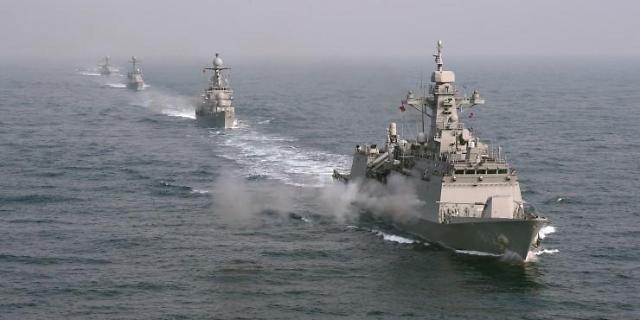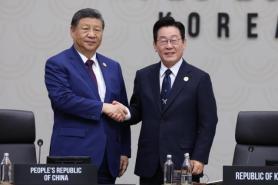
[Courtesy of Republic of Korea Armed Forces]
South Korea will deploy a new 5,000-ton patrol vessel in waters off its southern coast to bolster its territorial claim over Socotra, a submerged rock which has been at the center of a diplomatic row with China.
The vessel's deployment in April was disclosed in an annual policy briefing by the Ministry of Public Safety and Security to President Park Geun-hye on Tuesday.
Socotra Rock, known as Ieodo in South Korea and Suyan Rock in China, is 4.6 meters (15 ft) below sea level and is located 149 kilometers (93 miles) southwest of South Korea's southernmost island of Marado. It is 287 km away from China's Yushan Island of Zhejiang.
The rock lies within the overlapping exclusive economic zones (EEZ) of the two countries. The EEZ, which stretches out to 200 nautical miles from the coastline, is a sea zone over which a country has special rights regarding the exploration and use of marine resources.
Although international maritime law stipulates that a submerged rock cannot be claimed as territory by any country, South Korea effectively controls the rock by building a research station and a helipad in 2003.
China had been cautious in handling the dispute over Socotra, although it has been a quiet topic at official talks with South Korea.
Beijing, however, started raising its voice in 2013 when it unilaterally declared its Air Defense Identification Zone over the area and asked foreign aircrafts to identify themselves when flying through it.
China also called for an early resumption of maritime talks with South Korea during a bilateral summit last year, at a delicate juncture when it was locked in an array of territorial disputes with other countries.
Seoul wants the EEZ to be demarcated by drawing a median line, while Beijing insists the coasts and the population along them must be taken into account. China also argues the rock should be called Suyan Reef.
Rahul Raj, an adjunct professor at Hanyang University in Seoul, said in a recent article carried by the Korea Times that the Socotra row could seriously disrupt relations between South Korea and China.
"Now that it faces its own territorial tug of war with China, South Korea may find it difficult to remain neutral in such disputes in order to counteract China's growing assertiveness in claiming territories in the region. This could create further tension between the countries in the future and jeopardize a relationship that had been showing a great deal of closeness in recent years," he said.
Charles Lim
아주경제 임장원 기자 = cwlim34@ajunews.com
Copyright ⓒ Aju Press All rights reserved.



